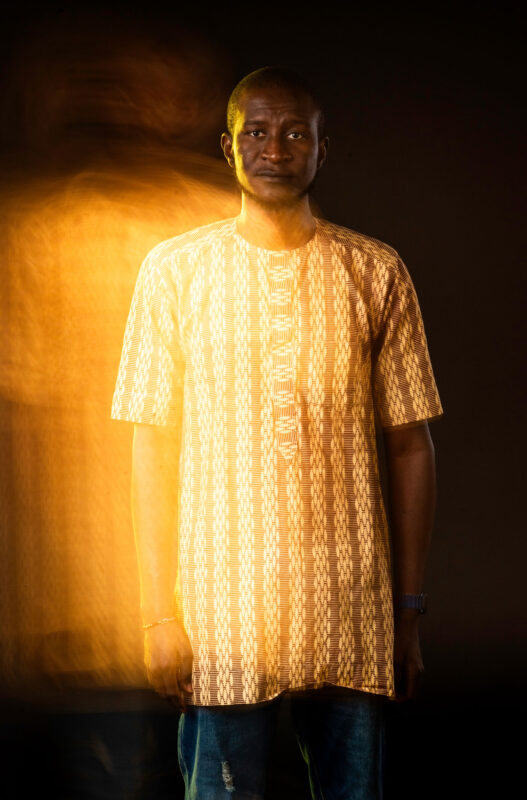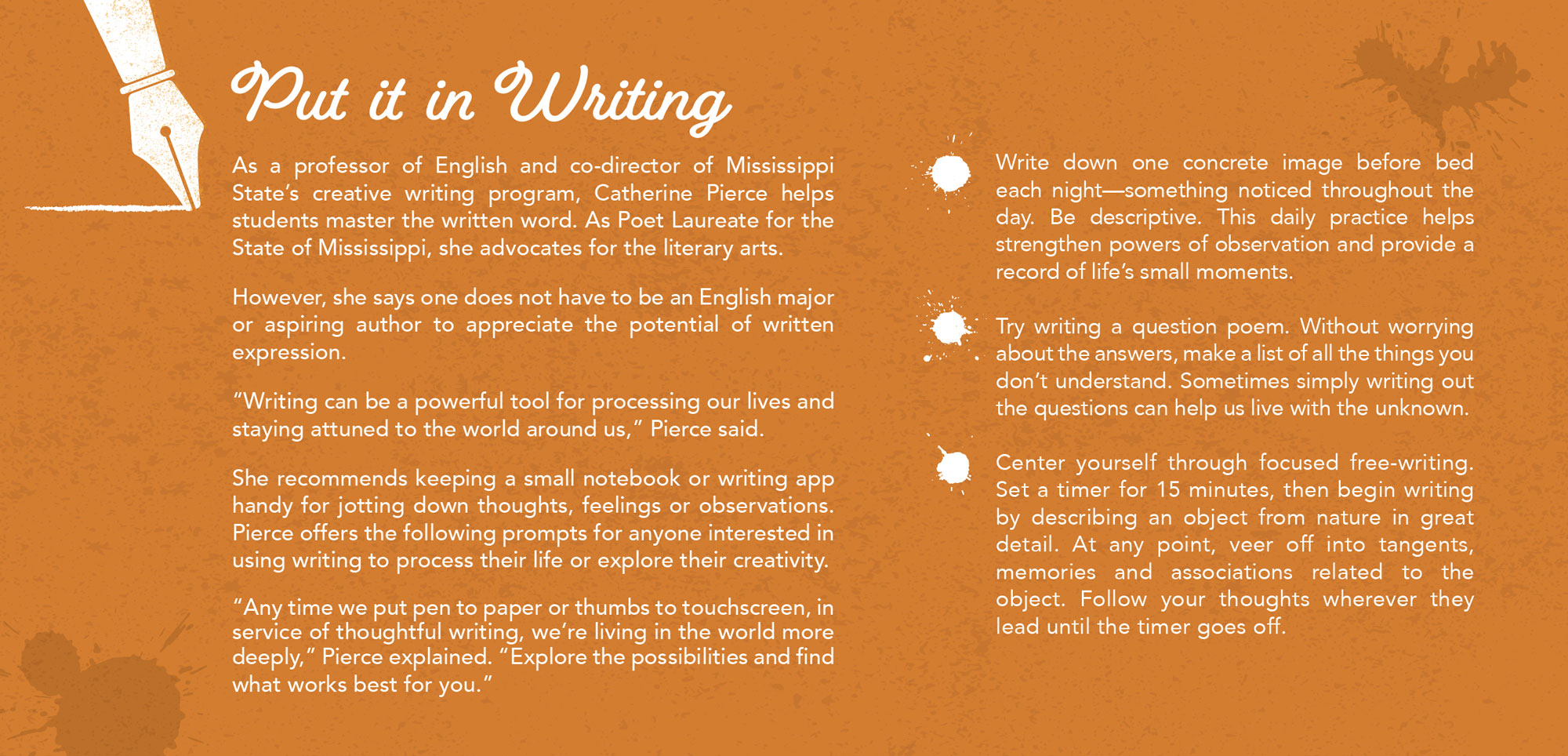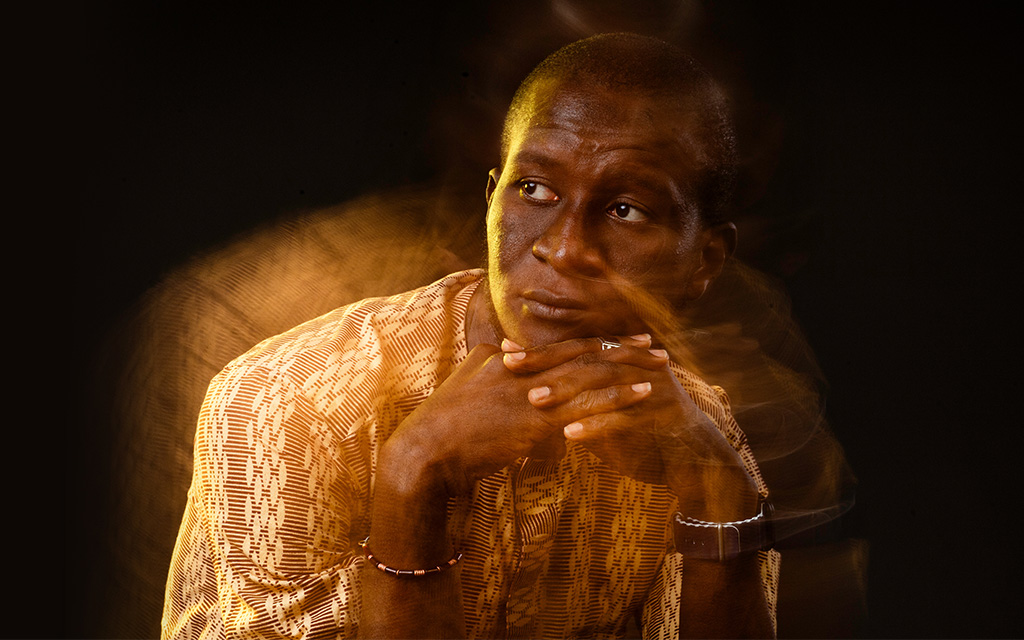MSU poet uses written word to reflect on life
Ask Saddiq Dzukogi how he landed at Mississippi State University, and he’ll laughingly explain how he came for the catfish but stayed for the crawfish.
The theme of the joke is pretty common among non-native Mississippians who know firsthand how Southern food can ensnare a person’s soul. But the quip belies the triumphs, challenges and tragedies that led to Dzukogi, a native of Minna, Nigeria, becoming a published poet teaching at an American university.
Despite being the son of published authors, Dzukogi didn’t learn to read until he was about 11 years old–not due to a lack of interest or intellect, he explained, but because no one seemed to realize he couldn’t.
“My father is very community minded. He’s very focused on other people’s kids and, for a minute, he forgot about me,” Dzukogi said. “Once I started learning, it only took me about six months to learn. Then, like any new skill, you want to showcase it. I read everything I could. Even in the bathroom, I would just read the labels of beauty products and soap.
“Then I challenged myself,” he continued. “I wasn’t just going to read. I was going to write.”
Within a year of learning to read, Dzukogi said he began writing stories—ones he made up and others recreating tales he heard from his grandmother. Eventually, his work made it into a weekly children’s newspaper distributed across the country.
“It was really payback for the people who laughed at me for not being able to read,” Dzukogi recalled. “They couldn’t believe that this person who couldn’t read yesterday was now being published.”
Dzukogi said writing became—and still is—his preferred way of interacting with the world due, in part, to his struggles with social anxiety.
“Writing allowed me to be myself and create a world where I was comfortable. I could literally have a conversation with myself and reflect,” Dzukogi said. “That’s something I still value because right now the world is full of so much noise that no one is listening; they’re just talking. Writing gives me space and allows me to take a step back to see and think and contend with where I stand in the world.”
While writing came somewhat naturally to Dzukogi, he focused his studies on science upon entering high school. At the time, he said he saw writing as only a hobby. By the time he decided he wanted to pursue language professionally, he was not allowed to major in English in college because his preliminary work was in science-related fields.
“It’s a hard thing to talk about, but I’ve made it into an art piece, and right now that’s the only way she’s present in the world.”
~ Saddiq Dzukogi
“I decided to find something I could major in that would be close to English,” Dzukogi said. “That ended up being mass communication, and I found that I liked it.”
Dzukogi earned his degree from Ahmadu Bello University and began working as a journalist. After several years though, it wasn’t exactly what he wanted. He worked his way through various jobs, including teaching, and eventually joined an agency that sets up libraries and creative writing centers. This path seemed to help feed his love of language and poetry, which he said was still a “hobby taken too seriously.” He was happy until fatherhood changed his perspective.
“I began to feel like I was losing myself,” Dzukogi said. “Then one day, I looked at my daughter, and she looked so innocent. I knew I wanted to give her a better life. I just wanted to be better for her so that the world would be better for her. I started to think again about trying to do poetry seriously and what I could do to advance myself. I decided maybe I should go back to school.”
Around that time, Dzukogi was published through the African Poetry Book Fund, a University of Nebraska foundation that publishes African poets each year. Through that experience, he was encouraged to apply to fine art graduate programs in America. He completed the process and was accepted at multiple universities.
Then, six months before the family moved to the U.S., Dzukogi’s daughter Baha—his motivation for pursuing a life in America—died 21 days after her first birthday.
“We still do not have clarity about what happened,” Dzukogi explained. “She fell sick while I was writing my materials for the applications. We took her to the hospital, but she passed quickly. We suspect it was some kind of infection.

“We came here without her, but I feel like part of the reason she came into the world was to put all of this in motion,” he said.
Coping with Baha’s death became the inspiration behind Dzukogi’s book of poetry “Your Crib, My Qibla,” published while he pursued a doctoral degree at the University of Nebraska-Lincoln.
The poetry collection, whose title refers to his daughter’s place of rest and the direction Muslims face while in prayer, has earned numerous awards and was shortlisted for the Nigeria Prize for Literature. It was also selected as one of Oprah Daily’s 29 best poetry books for 2021 and one of the Africa Centre’s 50 notable African books in the same year.
But for Dzukogi, the collection’s most important role is helping immortalize the life of his daughter.
“It’s a hard thing to talk about, but I’ve made it into an art piece, and right now that’s the only way she’s present in the world,” Dzukogi said. “When I was writing it, I wasn’t thinking of it as art. I just wanted a way to deal with the grief, and that has always been how I handle emotions. So, every day I would write poems to try to understand the emptiness that was roosting in my heart.”
Now an assistant professor in Mississippi State’s Department of English, Dzukogi helps students use the written word to process their emotions, interact with the world and communicate their ideas.
As a polyglot who speaks four languages, Dzukogi is well positioned to help students appreciate how putting their thoughts into words can give them a better understanding of themselves.
“I’m multilingual, and I’ve recently come to realize that the different languages reflect different parts of me,” Dzukogi explained. “For example, the language of my intellect—English—is different from the language of my dreams—Hausa—which is different from the language of my spirituality and how I talk to God, which is Arabic.”
By helping students process their thoughts and surroundings through written language, Dzukogi said he feels he is helping prepare them for the real world.
“It’s brutal out there, and you have to be able to present your ideas and the way you think about the world in a way that is nuanced and rigorous,” he explained. “I like to think of my classes as workshops where learning and practice can happen to build their critical thinking skills in preparation for the outside world.”
In addition to teaching classes, Dzukogi continues to work on his poetry and growing his body of published work. While he still uses it to process his interactions with the world, he is also exploring ways to use his art to help reestablish some of the oral history of native Nigerian cultures lost during colonization—like the traditional Hausa stories his grandmother told him that he later put to paper after learning to read.
“There have been a lot of writers who have written in Hausa, but then the British came, and there was an erosion of cultural tradition that happened,” he explained. “Now, there’s a lot of debate about what Nigerian poetry is, but I feel like I have found a unique voice that pulls influences from around the world while also relying on my culture and where I come from.”
Dzukogi said he’s proud to be part of redefining what Nigerian literature is, especially for his three living children who were born in America.
“I never thought what it would mean for my children to not be born in Nigeria,” Dzukogi said, noting that he and his wife ensure the children know of their Nigerian heritage, including the language and food.
And while his world looks very different from when he was 11 years old—struggling with anxiety and being left behind by his peers—Dzukogi says he is happy with where he is.
“The world—it’s the total aggregate of your joy and your sadness, and I feel pretty confident to say I’m happy even through everything that has happened to me,” he said.
By Susan Lassetter, Photos by Grace Cockrell



